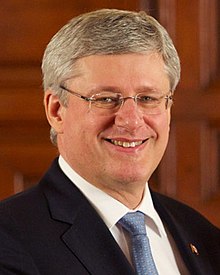Stephen Harper
|
The Right Honourable Stephen Harper PC |
|
|---|---|
 |
|
| 22nd Prime Minister of Canada | |
|
In office February 6, 2006 – November 4, 2015 |
|
| Monarch | Elizabeth II |
| Governor General |
Michaëlle Jean David Johnston |
| Preceded by | Paul Martin |
| Succeeded by | Justin Trudeau |
| Leader of the Opposition | |
|
In office March 20, 2004 – February 5, 2006 |
|
| Monarch | Elizabeth II |
| Prime Minister | Paul Martin |
| Preceded by | Grant Hill (acting) |
| Succeeded by | Bill Graham |
|
In office May 21, 2002 – January 8, 2004 |
|
| Monarch | Elizabeth II |
| Prime Minister |
Jean Chrétien Paul Martin |
| Preceded by | John Reynolds (acting) |
| Succeeded by | Grant Hill (acting) |
| Leader of the Conservative Party | |
|
In office March 20, 2004 – October 19, 2015 |
|
| Preceded by | John Lynch-Staunton (interim) |
| Succeeded by | Rona Ambrose (interim) |
| Leader of the Canadian Alliance | |
|
In office March 20, 2002 – December 7, 2003 |
|
| Preceded by | John Reynolds (interim) |
| Succeeded by | Position abolished |
| Member of the Canadian Parliament for Calgary Heritage |
|
|
In office October 19, 2015 – August 26, 2016 |
|
| Preceded by | first member |
| Succeeded by | TBD |
| Member of the Canadian Parliament for Calgary Southwest |
|
|
In office June 28, 2002 – August 4, 2015 |
|
| Preceded by | Preston Manning |
| Succeeded by | riding dissolved |
| Member of the Canadian Parliament for Calgary West |
|
|
In office October 25, 1993 – January 14, 1997 |
|
| Preceded by | Jim Hawkes |
| Succeeded by | Rob Anders |
| Personal details | |
| Born |
Stephen Joseph Harper April 30, 1959 Toronto, Ontario, Canada |
| Nationality | Canadian |
| Political party |
Liberal (before 1985) Progressive Conservative (1985–87) Reform (1987–97) Alliance (2002–03) Conservative (2003–present) |
| Spouse(s) | Laureen Teskey (m. 1993) |
| Children | 2 |
| Residence | Calgary, Alberta, Canada |
| Alma mater | University of Calgary |
| Religion | Christian and Missionary Alliance |
| Signature |  |
Stephen Joseph Harper PC (born April 30, 1959) is a Canadian retired politician who served as the 22nd Prime Minister of Canada, from February 6, 2006 to November 4, 2015. He was the first prime minister to come from the modern Conservative Party of Canada, which was formed by a merger of the Progressive Conservative Party and the Canadian Alliance.
Harper was member of parliament for the riding of Calgary Heritage in Alberta from 2002 to 2016 (previously known as Calgary Southwest from 2002 to 2015). Earlier, from 1993 to 1997, he was the MP for Calgary West, representing the Reform Party of Canada. He was one of the founding members of the Reform Party, but did not seek re-election in the 1997 federal election. Harper instead joined and later led the National Citizens Coalition, a conservative lobbyist group. In 2002, he succeeded as leader of the Canadian Alliance, the successor to the Reform Party and returned to parliament as Leader of the Opposition. In 2003, he reached an agreement with Progressive Conservative leader Peter MacKay for the merger of their two parties to form the Conservative Party of Canada. He was elected as the party's first leader, in March 2004. Harper stepped down as MP on August 26, 2016.
The 2006 federal election resulted in a minority government led by the Conservative Party with Harper becoming the 22nd Prime Minister of Canada. By proportion of seats, this was Canada's smallest minority government since Confederation. Despite this, it was the longest-serving minority government overall. In the 2008 federal election, the Conservative Party won a stronger minority, showing a small increase in the percentage of the popular vote and increased representation in the Canadian House of Commons, with 143 of 308 seats. The 40th Canadian Parliament was dissolved in March, 2011, after a no-confidence vote that deemed the Cabinet to be in contempt of parliament. In the federal election that followed, the Conservatives won a majority government, the first since the 2000 federal election; the party won 166 seats, an increase of 23 seats from the October 2008 election.
...
Wikipedia
